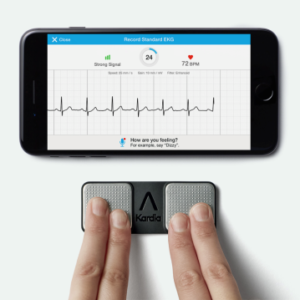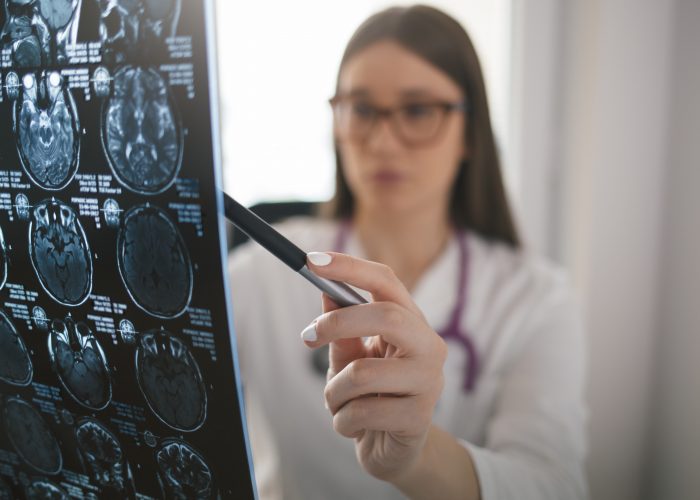 New data from NHS Digital shows that a nationwide push to find undiagnosed patients with an irregular heart rhythm known as atrial fibrillation (AF) has identified over 130,000 people within the first year. In addition, a record number of people with AF have been prescribed the anti-clotting therapy needed to reduce the likelihood of life-threatening strokes related to the condition.
New data from NHS Digital shows that a nationwide push to find undiagnosed patients with an irregular heart rhythm known as atrial fibrillation (AF) has identified over 130,000 people within the first year. In addition, a record number of people with AF have been prescribed the anti-clotting therapy needed to reduce the likelihood of life-threatening strokes related to the condition.
AF is the most common type of irregular heart rhythm and is a major risk factor for stroke, contributing to 1 in 5 strokes and associated with an increased rate of mortality. It is estimated that 1.4 million people in England have AF but nearly a third of these cases go undetected, and people with a diagnosis don’t always receive treatment, resulting in potentially avoidable strokes. A stroke can be a life-threatening condition, and people who survive a stroke are often left with long-term problems caused by injury to their brain. Each stroke costs the NHS and social care £22,429 in the first year alone.
A national programme was set up in 2017 by NHS England and Public Health England to tackle the issue of AF-related strokes. As part of this programme, the 15 Academic Health Science Networks (AHSNs) across England made AF a priority across the board, with the aim to ‘detect, protect and perfect’:
- Detection includes distributing more than 6000 devices for detecting the irregular heart rhythm, across primary care settings, to enable staff to more quickly detect and refer patients with AF.
- Protection uses a ‘virtual clinic’ approach, targeting people with AF on GP registers who are not receiving anticoagulation therapy. Specialist anticoagulant pharmacists meet with GPs and, with evidence-based decision making, conclude when patients should be referred for anticoagulation therapy.
- Finally, perfecting the process is about ensuring anticoagulation therapy is as effective as possible. The three London AHSNs and the London Clinical Network developed an online interactive toolkit which helps healthcare professionals navigate the AF care pathway so that they can provide patients with the most suitable course of treatment.
The latest NHS statistics show that the AHSNs are on track to achieve their target: a diagnosis for 85% of people thought to have atrial fibrillation. They have already met their target to have 84% of all AF patients on anticoagulation treatment. It is estimated that over 1,200 strokes have been avoided since the start of this programme of work in 2017, thanks to increased detection and treatment of AF. The plan going forward is to ensure that by 2020, 90% of people with AF have a diagnosis and to have more patients on the anticoagulation treatment that reduces risk of strokes.
NHS England’s National Clinical Director for Cardiovascular Disease Prevention, Dr Matt Kearney said:
“The recent increases in detection of atrial fibrillation and higher rates of anticoagulation demonstrated in the Quality and Outcomes Framework data (2017/18) will make a major impact on reducing the burden of stroke. It is testament to the joint work of Public Health England, RightCare and the AHSN Network in supporting general practice and community teams to deliver better outcomes for patients with AF, driving the reduction in AF related strokes, which is saving lives and money. The AF pathway approach that the Academic Health Science Networks have been embedding within AF stroke prevention over recent years has been fundamental in helping to deliver this.”
Professor Gary Ford, the Chief Executive of Oxford AHSN, is the AHSNs’ national AF lead, a consultant stroke physician at Oxford University Hospitals and Professor of Stroke Medicine at the University of Oxford. He said:
“New data from NHS Digital show the NHS has made major progress in detecting and treating people who have atrial fibrillation. However, one in five people with atrial fibrillation are unaware they have this irregular heart rhythm that puts them at an increased risk of stroke. Over the next 18 months the AHSN Network atrial fibrillation programme in partnership with Public Health England and RightCare will seek to ensure at least 9 out of 10 people with AF are aware of their heart irregularity and their stroke risk, and to further increase the number of people with AF who are treated with anticoagulant drugs.”



